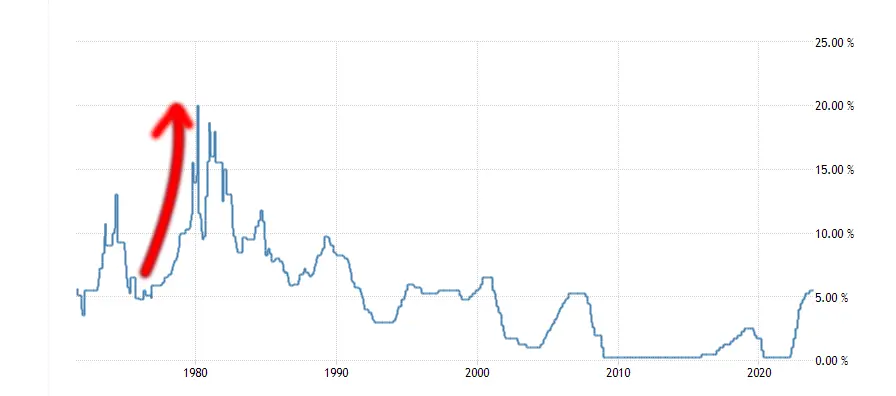Since the mid-1990’s we have been living in a golden age of low interest rates. And since the 2008 crisis, we have enjoyed historically low rates (until recently).
The Fed interest rate in the US hit an eye-watering high of 20% in March of 1980 and a historic low of 0.25% in 2008. That’s quite a spread.
Accordingly, different generations have completely different expectations when it comes to interest rates.
Some are still traumatized by the inflation of the 1980’s, and today’s rising rates come as no surprise.
The fallout of the pandemic has meant a whole new generation are experiencing the pain of interest rate rise affecting their mortgage payments. This, despite rates still being at relative lows.
This context I feel is important when we look at where interest rates might go next.
How do we assess interest rates today vs. the past? Where are we likely heading?
Comparing today’s interest rates with the past
Can we compare today’s rising inflation & interest rates with that of the 20th century?
Whilst a 20% rate is much more severe on paper than the 5% of today, you could argue the impact on people is relatively similar given:
- Smaller deposits were required in the 1980s.
- A mortgage payment at 20% interest was still a low percentage of their income.
- Things were cheaper, so your salary went a lot further.
In the UK, research from Leeds Building Society found that in 1980, the average UK house price was around £21,000 and mortgage costs accounted for 11.3% of disposable income.
Today, those figures are around £292,000 and 45.1% respectively.
Their research suggests the high rates of 6.43% mortgage rates of today are equivalent to a rate of 25.7% in 1980.
So, despite interest rates seeming low, it’s not clear the government can afford to let rates climb much higher without triggering widespread delinquency.
Sudden shock
Part of the trauma of the 1980’s was how sudden and dramatic the rise was. It caught many off guard.

You can be sure that if such a dramatic rise were to happen today, even if the rate jumped from 5% to 10%, the number of repossessions would skyrocket.
Not least because affordability has not been stress-tested to this level, but also because people simply would not have the time to prepare or react.
The new generation of home owners needs to understand how quickly your life can be turned upside down and have a plan for it. My advice would be:
- Start with a sizeable emergency fund.
- Buy less house than you can afford. That gives you a built in safety net.
- Lock in a long-term mortgage for peace of mind.
Can the average person predict interest rates?
Once the bank rates started to rise at the end of 2021, I noticed more speculation in financial communities on Reddit as to where rates might go.
I wanted to look back to see how good these communities were at predicting interest rates.
Here are 10 predictions, taken randomly, from average folk over a couple years:
| Date of prediction | Bank Rate at the time | Predicted Rate | Actual Bank Rate | Delta |
|---|---|---|---|---|
| 25/04/2021 | 0.10% | Lower Sept 2022 | 1.75% | -1.65 |
| 26/08/2021 | 0.10% | 0.1% in 1 year | 1.75% | -1.65 |
| 16/02/2022 | 0.50% | No higher than 2% | 4% 1 year later | -2 |
| 20/03/2022 | 0.50% | Stall before 3% | 4% 1 year later | -1 |
| 02/05/2022 | 1% | 5% worst case | 5.25% | -0.25 |
| 10/09/2022 | 1.75% | Never will go higher than 5% | 5.25% | -0.25 |
| 24/09/2022 | 2.25% | 5% by Mid-2023 | 5% June 2023 | 0 |
| 19/10/2022 | 2.25% | Lower in 12-18m | 5.25% 12m | -3 |
| 25/11/2022 | 3% | 4.50% | 5.25% | 0.75 |
| 16/12/2022 | 3.50% | Peak at 4.25% | 5.25% 11m | -1 |
Plotted on a graph you can see that most people underestimated where things were heading, and how bad they might get:

What can we take away from this?
- Most people were wrong, and many were very confidently wrong to boot. A lot of underestimates.
- With that said, some people absolutely nailed it.
- Plenty of users rightly said it’s impossible to predict, and often this was the highest comment.
- People who listened to and quoted industry experts (which I did not include, I wanted personal predictions) were usually pretty much spot on. Who’d have thought!
- Anecdotally, it seemed people who lived through previous high-interest decades were a lot more accurate about where things were going, even if they weren’t willing to give a prediction.
I appreciate this is ‘outcome bias’. You could argue it was still a coin flip as to where things might go.
But in hindsight, rising interest rates seemed obvious. As a gross oversimplification:
- The pandemic led to the government printing money.
- All that cash causes high inflation.
- High inflation is controlled by raising interest rates.
Expectation Theory
So, predicting interest rates is hard. One solution to the problem is expectation theory.
This theory posits that long-term interest rates are unbiased predictors of future short-term interest rates.
This is handy because often, decisions we need to make about our mortgages are over a shorter time horizon.
Expectation theory says, for example, if you get a ten-year bond today, and another ten years from now, the return should equal the return on getting a 20-year bond today.
In theory, you can use the long-term rates to indicate where short-term rates will trade in the future. In other words, long-term rates tell us where we’re headed.
This theory is somewhat an over-simplification and assumption of a perfect market environment, but interesting, nonetheless.
How interest rates burned me
When I locked in a mortgage of 2.5% for 2-years, I, and most others, expected interest rates to remain at historical lows. It’s all we’ve ever really known, us millennials.
The idea is that more equity in my property would allow for an even lower mortgage rate in two years’ time (oh my sweet summer child).
This year, my mortgage payment increased by a third. I had been stressed test for a mortgage of 5%, but I did not in all honesty think it would actually happen within two years.
Hindsight is 20/20, but perhaps if I’d truly understood the history of interest rates, I could have made a better decision. So, I’m changing my mindset for 2024 and beyond.
The 2024 Mindset
Predicting interest rates is a fool’s errand. You might as well get out your crystal ball.
Ultimately, it is not about predicting interest rates. It is about understanding the historical context of where interest rates could go and tailoring it to your income level & risk appetite.
Knowing interest more rate rises are a very real possibility, there are two things:
- Testing my affordability for higher interest rates. Ensuring, if we do level up to a bigger house, we can actually afford it should interest rates double.
- Locking in longer fixes. A guaranteed payment you know you can afford is much preferable to a variable one that could one day wipe you out.
The peace of mind of a fixed payment far outweighs the gamble of future interest rate changes in 2024.
Where will interest rates go in 2024?
It would be unfair to not make my own prediction after all of this, despite it being a fool’s errand.
It hinges on whether a deep recession happens in 2024. I am betting it does not.
Therefore, I predict by December 2024, interest rates will be at 4.25% in the UK and 4.1% in the US.






